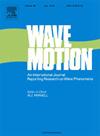Analytical and numerical study of plane progressive thermoacoustic shock waves in complex plasmas
IF 2.1
3区 物理与天体物理
Q2 ACOUSTICS
引用次数: 0
Abstract
The formation of thermoacoustic shocks is studied in a fluid complex plasma. The thermoacoustic wave mode can be damped (or anti-damped) when the contribution from the thermoacoustic interaction is lower (or higher) than that due to the particle collision and/or the kinematic viscosity. In the nonlinear regime, the thermoacoustic wave, propagating with the acoustic speed, can evolve into small amplitude shocks whose dynamics are governed by the Bateman-Burgers equation with an additional nonlinear term that appears due to the particle collision and nonreciprocal interactions of charged particles providing the thermal feedback. The appearance of such nonlinearity can cause the shock fronts to be stable (or unstable) depending on the collision frequency remains below (or above) a critical value and the thermal feedback is positive. The existence of different kinds of shocks and their characteristics are analyzed analytically and numerically with the system parameters that characterize the thermal feedback, thermal diffusion, heat capacity per fluid particle, the particle collision and the fluid viscosity. A good agreement between analytical and numerical results is also noticed.
复杂等离子体中平面渐进热声激波的分析与数值研究
研究了流体复合等离子体中热声冲击的形成。当热声相互作用的贡献比粒子碰撞和/或运动粘度的贡献低(或高)时,热声波模式可以被阻尼(或反阻尼)。在非线性状态下,以声速传播的热声波可以演变成小振幅激波,其动力学由Bateman-Burgers方程控制,该方程带有由于粒子碰撞和带电粒子提供热反馈的非互反相互作用而出现的附加非线性项。这种非线性的出现可能导致冲击锋稳定(或不稳定),这取决于碰撞频率保持低于(或高于)临界值,热反馈是正的。利用表征热反馈、热扩散、单颗粒热容、颗粒碰撞和流体粘度的系统参数,对不同类型冲击的存在及其特性进行了解析和数值分析。分析结果与数值结果吻合较好。
本文章由计算机程序翻译,如有差异,请以英文原文为准。
求助全文
约1分钟内获得全文
求助全文
来源期刊

Wave Motion
物理-力学
CiteScore
4.10
自引率
8.30%
发文量
118
审稿时长
3 months
期刊介绍:
Wave Motion is devoted to the cross fertilization of ideas, and to stimulating interaction between workers in various research areas in which wave propagation phenomena play a dominant role. The description and analysis of wave propagation phenomena provides a unifying thread connecting diverse areas of engineering and the physical sciences such as acoustics, optics, geophysics, seismology, electromagnetic theory, solid and fluid mechanics.
The journal publishes papers on analytical, numerical and experimental methods. Papers that address fundamentally new topics in wave phenomena or develop wave propagation methods for solving direct and inverse problems are of interest to the journal.
 求助内容:
求助内容: 应助结果提醒方式:
应助结果提醒方式:


